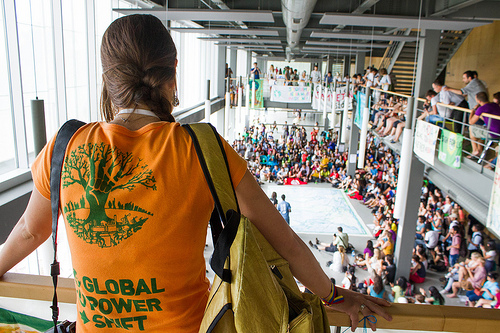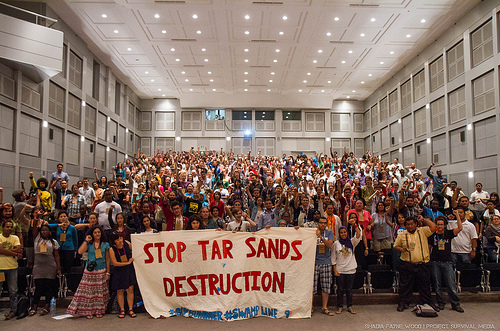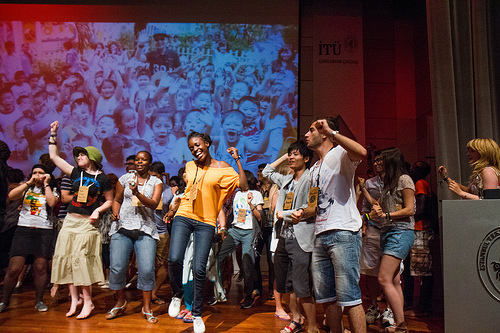2013年の6月に、130カ国以上から500人もの若い活動家が集まって、気候危機を防止するために5日間の戦略会議とトレーニングGlobal Power Shiftが行われた。

アラブの春に参加していた若い革命家や、ニューヨークのオキュパイ・ウォール街に関わっていた活動家とか、サダム・フセインにデモをしていたイラクのクルド人とか…。
平和、民主主義、エコロジー、次世代のために、命懸けで活動していた世界中の人たちとの出会いは、永遠の宝物。

独裁者との癒着(ロシア、サウジアラビアなど)、暗殺、汚職、情報操作がビジネス戦略にすぎない石油産業に、正面から立ち向かう多くの老若男女と共に5日間過ごすのは、ものすごく刺激的だった。
日本に帰ってきて、日本支部のPower Shift Japanを仲間たちと共に立ち上げてみた。東京大学の大学院に通いながら、日本で活動を始めたての頃。
当時のブログ→ http://powershiftjapan.blogspot.com
パワーシフトの記事
https://greenz.jp/2014/02/08/power-shift-japan/
10周年となった今年、Global Power Shiftから、その後の展開のブログ記事を募集中と連絡が来たので、感謝の気持ちを込めて、振り返りながら記事を書いてみた。
たびたび、Fridays For Futureの若者と会ったり、気候危機になんとか取り組みたい人と話す中で、長年活動(学生時代の2002年から活動してきた)する中での経験と挫折(燃え尽き、鬱病、去っていく仲間、効果が感じられない)をしてきた個人的な話をシェアすることが、役に立つかもと思い、TUPのブログにも投稿することにしてみた(英語だけど)。
目に見える変化を起こすのは簡単じゃない。
だからこそ、より多くの人が立ち上がって取り組む必要がある。
嘘を生き続けるより、真実の道を歩もう。
Global Power Shiftのページもcheck it out!
https://350.org/gps-10-years/
以下は、僕が寄稿した記事
https://350.org/kai-sawyer-founder-of-tokyo-urban-permaculture-and-peace-and-permaculture-dojo/ より
I was deeply moved by the GPS gathering in Turkey, getting to meet so many young people from around the world working on climate change and social justice. I was extremely inspired and remember thinking “how cool are these activists! They are real action heroes!”, when attending the direct action training. Meeting the young people who joined the Arab Spring protests, the artivist workshops, and “seeing” the Gezi Park protests are some of my fond memories.
Part desire to make real change, part momentum from GPS, and part a sense of indebtedness, I organized Power Shift Japan right after returning to Tokyo.
CHALLENGES
I faced many challenges (as usual) trying to organize this movement.
First, all the other Japanese that I attended with, quickly got “too busy” with their lives/work and I was the only person who attended GPS that continued to work on Power Shift. It was a blow to my morale and feeling somewhat resentful of the others (my own problem).
Second, I was in clinical depression, and in some ways activism helps, in some ways it worsens the depression. It’s hard for me to effectively organize in depression, as I have anxiety around trusting people, and decreased cognitive capacity to organize thoughts and keep track of things.
Third, my activism in Japan had focused on the aftermath of the Fukushima nuclear disaster, and the national mood was more concerned with nuclear disaster than climate change. And, as nuclear power has often been promoted as the antidote to climate change, it was hard to gain interest and come up with a persuasive narrative that included both causes.
Forth, Japanese activism had been effectively disempowered in the 70s and 80s, with a powerful education/media campaign to believe activism is dangerous and violent, and that to be part of “normal society” you do not want to associate with activism. And as modern Japanese are extremely resistant to challenging authority, it was very hard to find an approach that would work.
ACTIVISM
After doing a few GPS report-back events, I co-organized with a group of youth activists to organize two-day Power Shift Japan gathering in 2014 (February 22-23). This was in collaboration with Greenpeace Japan, Friends Of the Earth Japan, and Kiko network. Liangyi Chang from 350.org in Taiwan came as a special guest. We had over 40 attendees. Power Shift Japan lasted for about a year, but we couldn’t find a strong enough core to keep going.
I was also asked to help organize “The Future”, a performance based youth climate change initiative started in the UK and funded by LUSH with no strings attached. We did a few actions, got great pictures, but that movement also lost momentum.
I continued to speak at universities, do youth oriented activism workshops and trainings, write articles, and speak to the media.
Most of my activism I do under the name Tokyo Urban Permaculture. I train people in permaculture, Nonviolent Communication (NVC) and social justice, mindfulness, gift economy, and Gandhian nonviolence (inspired by the book Gandhian Iceberg). I realized that we don’t have much of an infrastructure to support activism in Japan, and since Japanese are comfortable learning, doing workshops and trainings is the easiest (to gather people, empower, and deepen awareness) and perhaps most effective longterm investment for social change.
Some big projects include
- a book in Japanese “Urban Permaculture Guide: how to redesign your life in the city” which includes topics like guerrilla gardening, composting, and social change.
- a children’s book, now translated into 5 languages “Our Earth Our Home” which focuses on ecology and activism for children https://www.parallax.org/product/our-earth-our-home/
- a community rooftop garden right at the heart of Nagatacho, the center of national politics in Japan
- the Peace and Permaculture Dojo, an activist training center, experimentation lab, and social-ecological “life-boat” , inspired by Gandhi Ashrams and other similar land-based social change initiatives. We cook all of our food with local wood and bamboo and sun, slowly shifting off of the grid, and inspiring others by making it fun (instead of “the right thing to do”)
- two-week NVC and ecology-social justice training
- Social change themed permaculture documentary featuring Japanese and West Coast (USA) initiatives. (currently being translated to English) https://teararoa.wp-x.jp/?page_id=9902
- Working with Helena Norberg-Hodge and Local Futures on localization and anti-globalization, Satish Kumar and Schumacher College on holistic living, Vandana Shiva and Navdanya (this year) on earth democracy, and Manish Jain and the ecoversity alliance on reimagining education.
Learn more about Kai’s activism:
Tokyo Urban Permaculture website
Peace and Permaculture website
https://peaceandpermadojo.wixsite.com/home/english
English YouTube site (under construction)

